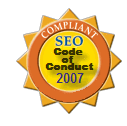The equally titled panel discussion at Search Engine Strategies San Jose in August moderated by Jeffrey K. Rohrs, with Shari Thurow, Kristopher Jones, Kathleen Fealy, Jennifer Laycock and Jonathan Hochman as speakers, was very emotional. I would say that it was even more filled with emotions than the “hot” panel discussion “Are Paid Links Evil?” which caused quite some stirs in the industry.
That the emotions were stronger is no surprise, considering the fact that “search engine optimization professionals are often treated as if they have the plague” (Shari quoted) and that the misconception that SEOs do evil stuff and spam the search engines (e.g. optimization = spam) is wide spread like the misconception and prejudges that lawyers are liars and car sales-men crooks.
Lisa Barone from Bruce Clay, Inc. and Tamar Weinberg from Search Engine Round Table did a good job covering the panel discussion itself, if you want to get more details about that.
SEOs are Crooks and Liars
If you are a crook and liar you don’t mind if people call you what you are, but if you are not and in fact the vast majority of people that do what you do are not either, then it is very saddening and does not make you feel better. It does make the environment you live and work in much more hostile and ugly. It also makes your actual job a lot harder, because you have to convince a number of people first that you are not the devil and that you are not doing the devils work, before you can even do what you do best: search engine optimization.

People are not getting their misconception and prejudges out of nowhere. There are reasons why people belief what they belief. The cause of the bad reputation of search engine marketers and SEOs are the bad examples in the industry that do exist and do what people think all of them do.
Jonathan showed some Wikipedia examples of actual spam within Wikipedia, how editors react to them and their attitude after years of reversion a countless numbers of spammy edits that contribute to the bad opinion many Wikipedians have about SEOs and internet marketers in general.
Kris Jones showed some other bad examples that reflect poorly on the reputation of the industry by doing a search on Google for the phrase “guaranteed search engine placement“. A bunch of services pop up who offer ranking guarantees. I used my own example by entering “number one search engine rankings” into the Google search box.
One of the top paid results offers the service to get your site into the top 10 results in Google, Yahoo!, Ask.com and siblings and partners of those search engines, and some smaller engines guaranteed within seven days and that just for the low price of $50 to $200.
It is a monthly subscription, which makes me wonder what will happen to a customer’s top 10 listing if he decides to cancel the service. Microsoft is also not included for unknown reason. People believe those promises, fall for them and have a very negative attitude towards the industry they were burned by services that make guarantees that are unrealistic and create or reinforce wrong expectations by the customer. Kathleen said correctly “Perceptions = Reality”.
Damage Control
Now the damage is done and all the “ethical” SEOs have a problem on their hands they’d rather not want to have. The question was asked what to do against this and how to get the general idea into people’s minds what ethical SEO actually is and what it is not.
Kathleen proposed a list of actions. The other speakers and the general audience of the panel discussion more or less acknowledged this list as right and good.
- Educating businesses
- Jargon can be good BUT clearly explain the terms
- Seminars and site clinics
- Help businesses understand that its important that they know their objectives and they can’t just be “I want to be #1 in the search engines.”
- Increase conversions
- Increase traffic into stores
- Name recognition.
- Manage client and potential client expectations
- Warn them about spam emails offering services
- Explain why there are no guarantees
Sounds great and I agree with it in general, but there are some details where I have a bit different view.
 Taking One Step Back
Taking One Step Back
Let us start with the some questions that should in my opinion answered first, before you can start going around and educate people about them. What is ethical and what is not? What are the industry standards? What are considered the industries best practices?
Search marketing has an organization, SEMPO, that is somewhat accepted and respected by the industry, a huge advantage search marketers have over affiliate marketers who are working in an industry that battles very similar problems as SEOs. Answering my previous questions is what an industry organization is designed to do.
There Is No Such Thing as 100% Consensus
Not everybody will agree, but it is not about unanimous agreement.  It is about self-regulation, which also means self-restriction. The outline of the definition of what are considered good practices and bad practices is also an important purpose of an industry organization. A rating system and/or certification mechanism that attests to companies that they actually follow those practices is the next logical step.
It is about self-regulation, which also means self-restriction. The outline of the definition of what are considered good practices and bad practices is also an important purpose of an industry organization. A rating system and/or certification mechanism that attests to companies that they actually follow those practices is the next logical step.
Somebody who does or wants to engage in bad business practices does not seek a seal of approval, but will try to prevent the general acceptance of such a seal by the vast majority of businesses in the industry. Such a seal would require some explaining by companies that refuse to comply and thus do not receive the seal.
Businesses that look for a SEO service and do not know the industry use those seals as guide, because that is often the only third party and independent acknowledgement of the company they have.
Anybody can claim to follow “best practices”, if those best practices are nowhere defined and acknowledged as such by a somewhat neutral but knowledgably to the subject entity.
Theory and Reality
Educate people, create articles, guides and provide tips.
This sounds great in theory, but if you publish the stuff on your own business website, those things are just your opinion and/or your sales letter to the outside world, no more and no less.
The site that guarantees page one ranking does the same thing. How can an outside entity that does not know the details of the business know, who it can believe and trust and who not?
Actionable Suggestions
Education has to be done via an outside source, something that is not part of the industry and somewhat trusted to a degree by the public
It could also be a source within the industry, if this source represents the majority of the businesses in the industry, e.g. an industry organization or other entity within the industry created for the purpose of self-regulation.
 SEOs do not like Wikipedia, but Wikipedia is actually a place where non-SEOs look for information. While Wikipedia is not the place to push an opinion and political agenda, so is it a good place to educate people about the facts and fiction in SEO. Articles are scrutinized eventually and promotional and original content will not stick forever, especially if the subject draws quite some attention and traffic to itself.
SEOs do not like Wikipedia, but Wikipedia is actually a place where non-SEOs look for information. While Wikipedia is not the place to push an opinion and political agenda, so is it a good place to educate people about the facts and fiction in SEO. Articles are scrutinized eventually and promotional and original content will not stick forever, especially if the subject draws quite some attention and traffic to itself.
 Wikipedia is not the only place where neutral and factual correct education about the subject is possible. I am sure the FTC would be glad to provide the space and some resources on their part, if SEOs would be willing to work together with them on educational material that is useful for people who want to learn about search engine optimization and the SEO industry, including its benefits, its issues, how it works and why it works etc.
Wikipedia is not the only place where neutral and factual correct education about the subject is possible. I am sure the FTC would be glad to provide the space and some resources on their part, if SEOs would be willing to work together with them on educational material that is useful for people who want to learn about search engine optimization and the SEO industry, including its benefits, its issues, how it works and why it works etc.
 SEMPO could also become a place for that. SEMPO could become like an elected spokes person that represents the industry to the outside world. If you go to a place, where you have never been before and know nothing or only little about, checking out the “tourist information” office that is operated by the local administration of the place is probably not the worst of places to get some information about it.
SEMPO could also become a place for that. SEMPO could become like an elected spokes person that represents the industry to the outside world. If you go to a place, where you have never been before and know nothing or only little about, checking out the “tourist information” office that is operated by the local administration of the place is probably not the worst of places to get some information about it.
SEOs Stop Thinking Like SEOs for a Moment
However, SEOs want to keep that kind of “good” and much linked to content on their own sites, for SEO purposes, duh.
This kind of thinking is typical for many professionals. It is like asking sales people to give the product away free, which they could have sold to that person and earned commission. If it would not be for the marketer, the sales person would never have given it away and forgo voluntarily his commission.
He is in sales and most people in sales think like that. The idea that giving up revenue at the right time for the right thing can actually increase revenue and the overall bottom line of the company are alien to him and to say it quite frankly, also not his job. That is not what makes him a good sales person.
Unfortunately, there is no “marketing guy” who can convince the “sales guy” aka SEO to sacrifice his “commission” this one time for a greater good and future return. It will be beneficial, not just for him, but also for his fellow colleagues (and competitors) down the road. Maybe there is one… at least I tried.
Quick Personal Note
It has been a while since I last posted. I was (and are) crazy busy and now also “permanent resident” of this country, by the way. This post was on my “want to-do list” for a while and I finally got around writing it up. It turned out to become a long post again, sorry, but it seems that I have to live with it as much as you do. Cheers!
Carsten Cumbrowski
Internet marketing resources at cumbrowski.com, including a list of search and internet marketing organizations and other search engine optimization resources.



